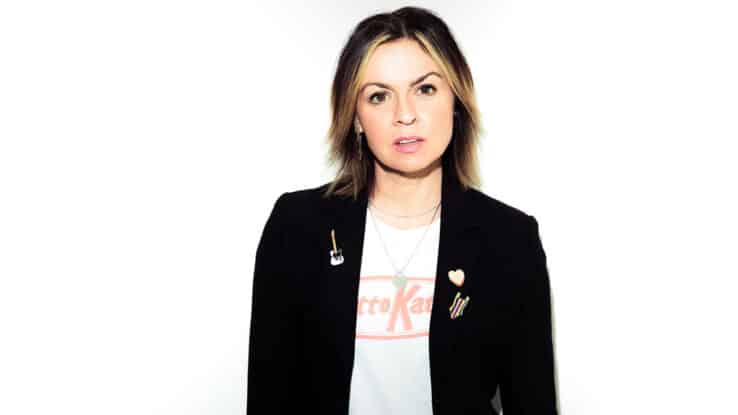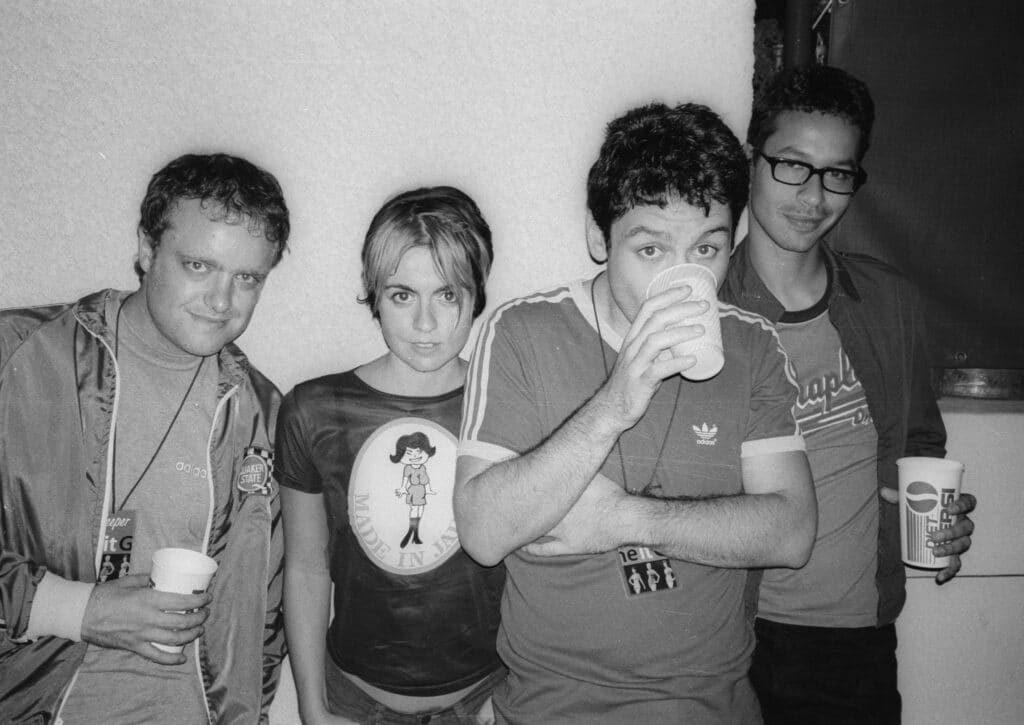Interview

Interview
My Greatest Hits: Louise Wener
Sleeper’s Louise Wener picks her own favourite moments from her history with the band that defined an era
Britpop has officially been bottled. Blur’s Alex James recently released his own English champagne (with floral, peach notes and a nutty, biscuity complexity) that he’s branded “Britpop Brut” – coming soon to a sponsored ad near you. “I’m sure we’ll all be rushing out to buy that!” laughs Louise Wener. “Although I think we probably won’t…”
As the lead singer, songwriter and guitarist of Sleeper, Wener knows more than most about Britain’s 90s cultural revolution – and why it can’t ever be put into a bottle.
“When I think about Britpop, I sort of think of the ‘Country House’ video,” she says. “I think of a slightly tongue-in-cheek postmodern knees-up. But it was obviously much larger than that. I’m just not sure how useful a term it is. It was always someone else’s terminology. And I always had to talk about my place within it, even though it was a media term. But, you know, I just don’t care about it enough anymore to hate it.”
Now looking back over more than three decades of Sleeper, Wener is returning to the small stages she started out on for The Music Venue Trust’s United By Music Tour, playing grassroots venues around the UK.
We sat down with Wener and asked her to pick her own greatest hits highlights from the last 30 years.
Joining my first band

“I was at University in Manchester and I joined a little jazz band. We were just singing covers to make a bit of extra money to get us through student life. We were called The Lime Street Blues Band and there were five of us, I think. We had a double bass player and a violinist, and it was all old Ella Fitzgerald songs, like properly classic stuff.
“I grew up with jazz. My dad was really into it and he was always playing jazz records at home. But then we sort of morphed into a proper indie rock band called ‘Surrender Dorothy’, which was the first iteration of Sleeper. It was terrible. We went through loads of different variations, and different members, until we got it right. But that stuff takes time. You have to go out and play and learn and perfect the way to do it, you know?
“I’d never met anyone in a band. No one was in a band in school, and it wasn’t part of what I grew up with. But when I was at college, everyone seemed to be in a band. And I think I’d just always wanted to do it. As soon as it hit me, I was like… this is it. This is the best thing.”
Getting signed
“Starting out is a really difficult period for any band, because it always feels just that tiny bit out of reach. We did one gig at The Mean Fiddler [in Harlesden, North London] and the A&R guy who eventually signed us was there. I think they’d been following us for a while, but that’s when they finally made the call and offered us a deal.
“I mean, it felt sort of magical. It felt like one of those impossible things that was never going to happen. I was kind of in a dreamlike state. It didn’t end up being a dream, I’ve got to say, because the deal was really sh*t, but we didn’t know or care at that point! We were just like, oh my god, we’re in a band… we’ve got a record deal. I remember going to Camden Market and treating myself to a new leather jacket. I even told the guy on the stall that I’d just gotten a record deal! I wore that little leather jacket right through the early years of Sleeper.
“I think that period in a band’s life is sometimes the most wonderful. Because you’re just completely lacking any self-consciousness. You’re just out there feeling that you deserve it all. Suddenly you’re getting paid a little bit of money and you can afford to rehearse. It felt real.”
Supporting Blur on the Parklife tour
“This was 1994. And it kind of felt like… an eruption. That whole period of music, that whole scene, whatever you want to call it, felt like it was just about to burst. I remember playing one or two nights at Shepherd’s Bush Empire supporting Blur and it felt like the balconies were going to collapse. I mean, there were so many people, everyone just rammed to the rafters. People were jumping up and down in those balconies, and it felt like the building was moving. I remember people chanting ‘Jesus’ at Damon [Albarn]. It was extraordinary. It felt like we were part of this incredible thing. It was a full-on tour too, and there was a lot of raucous behaviour going on, so that was… interesting.
“We were pretty grateful to have that opportunity and to get in front of a big crowd. It was all part of us moving into that headline slot ourselves. But as that Britpop wave went on, you realised what a patronising environment it ended up being for women. You know, we were sort of just looked at as a little bit of a novelty. The way we were viewed and talked about was just completely different. And it was something you felt you had to fight against the entire time. It felt like a battle. But in the beginning stages of the band, we didn’t have any of that.”
Appearing on Top Of The Pops
“This would have been around the same time, for ‘Inbetweener’, our first Top 20 single. You know, I grew up watching Top Of The Pops religiously, ever since I was a little kid, and it felt like one of those impossible moments. And it’s kind of interesting because there’s such an ordinariness about it, as well. The studios are quiet. It’s all these little breezeblock corridors that feel like tea trolleys have been pushed along them, you know? Then you get on the stage, and you hear that intro music… When you start your performance, it just felt electric. You thought about everybody else that had done it, and what it represented to us growing up.
“I can’t remember if it was live, or if it was mimed. It used to vary, depending on who was producing. Our first ever TV performance was on The Word, and that was completely live. I can definitely remember being the most nervous I’ve ever been. Suddenly I was on and I couldn’t remember how the song went. I started playing guitar and I had no idea what the first word was. I was about to completely freeze up. And then it came. And it was fine.”
Releasing Smart
“Your first album is hugely important. It’s something you’ve worked on all your life, in a sense. You have to learn how to make a record too – just going out and playing live is one thing, but making a record is a whole different skill set. And we really didn’t know how to do it. I think we kind of broke our first producer.
“We were recording it at all hours of the night. All day too. We were re-recording everything. It was kind of chaotic, but it was full of energy. By the end of it, we kind of got it honed down. We started working with Stephen Street and he mixed it and brought everything together and sort of made it work. It’s got a lot of that energy and chaos and attitude harnessed to it. I can really feel that when I listen to it still, and it feels like so much of the personality of who we all were at that point in our lives.
“We went to HMV on Tottenham Court Road and just sort of looked at it. There was a big poster in the window, and we took a few pictures. It was another one of those strange markers that you can’t believe you’re living through. You’ve imagined one day you’d have a record out that’s got your name on it, and here it is… it felt very important.”
Touring with Elvis Costello and REM
“The media side of things was quite full on, but when you’re on tour you’re away from it all. You’re just doing your job. You didn’t have someone with a camera following you on stage. There was none of what bands have now, constantly having to update social media. There was a sort of liberation and freedom to just be yourself and do what it is that you do, as well as you could.
“Elvis Costello had just done a cover version of ‘What Do I Do Now’, and he asked us to come with him on his American tour. It felt like a real adventure and a privilege to be part of that, just travelling around America in all those big, proper, fantastic venues. Beautiful old theatres and huge outdoor stages. Watching him every night was just incredible too.
“I think those early experiences of touring with other bands are so important. Touring can be harsh sometimes, because you’re constantly on the road, but you learn a lot from watching a band like that up close and seeing how they work together. You know, there were a lot of arguments between that band. They weren’t all getting on, and you could sense the difficulty between them all. But you have to learn than that things aren’t always perfect. When you’re growing up, you think all those headline bands have it sorted, but it doesn’t always work that way. We’ve all got stuff going on.
“We played with REM at Milton Keynes Bowl, with Radiohead and The Cranberries. It was just incredible. I’d seen David Bowie play on that stage… You’re not quite prepared for it when you walk out and see the vastness of that audience. It was so huge. Then Michael Stipe took me on stage, during their show, and got the crowd to sing happy birthday to me, because it was my 29th birthday. That was quite a moment!”
The success of The It Girl
“I think I felt that we had some songs that were just gonna cross over a little bit more on The It Girl. I felt like I’d found my form, when I was writing them. I was able to take more time over it too. I remember writing ‘What Do I Do Now’ on a tour bus in America and thinking, that’s really great. Me and Andy [drummer and husband, Andy Maclure] wrote ‘Sale Of The Century’ together, and we stayed up all night working on it. We lived in Hampstead Heath, and I remember going up to the heath to watch the sunrise and going, ‘I think we’ve written a hit song’. I mean, I kind of had that sense that I’d written something that might carry, and last. I think the first album was just us pouring all of our energy out in the most chaotic, but brilliant way we could, but this was just a bit more considered and thought out. It wasn’t a difficult second album, it felt like an easier album to make in some ways.
“We just wanted to relish the success that we found after that. We wanted to relax into it and enjoy it for a bit. But it also brought extra pressures. Suddenly, the media went mad. So much of our time, and my time, was taken up doing interviews and with suddenly becoming this sort of strange kind of media creature. I got good at it. And I worked out a way to do it. But I also found it quite difficult. That was not my not my natural state – I’m kind of quite introverted. So having all of that become such a demand was not something I was particularly comfortable with.”
Coming back to music after 20 years
“When I think back on it now, from my point of view, I left the music industry because I found it so hard. I found the treatment hard. The way that I was viewed, the way women were viewed… I just didn’t want to be in it anymore. I didn’t want to be there. I just wanted to completely retreat from it and walk away, utterly. I think it’s interesting that a lot of women did the same. Whereas a lot of the guys kind of soldiered on, in different guises.
“I went and did other things and started a new career. But I came back to it because I had had a family tragedy. My sister died of cancer. Suddenly, I had this mad impulse to go and do something completely out of my comfort zone. That was the reason we decided to do a few gigs, just to see if we could. But it wasn’t planned that way. Andy had already sold his drum kit – I told him he couldn’t keep it in the attic!
“It was very much an impulsive moment of March Madness. I didn’t know if I could still do it, and I think that was the attraction. I’d just turned 50 and there’s all kinds of stuff about how women are viewed at that age taking centre stage. It felt like a challenge. But it also felt quite important, on some level.
“And then… it was surprising how enjoyable it was. It felt like this version of Sleeper completely belonged to us. It wasn’t about pleasing anybody else. It wasn’t about pleasing a record company, or reviewers or media entities. It was something that belonged to us and the fans. And that felt quite unique and lovely.”
Releasing The Modern Age
“I’d forgotten how brilliant that moment is – when you sit with a guitar, and you come up with a tune that you love, and a set of lyrics that you love. I’d forgotten the immediacy of it. When you write a book, it takes a year or more, you know? But there’s such a brilliant ferocious immediacy about writing a song that can just sort of come together in five minutes sometimes. It’s quite magical, I think. And that was its own engine, really.
“Originally we were just going to put out a bunch of ‘lost’ songs but when we started writing new material, it just came together really well. I think it’s just a more honest album. When I was writing in the 90s, I often covered things by writing about characters. I’d put the thing that I was feeling into someone else, to sort of cover myself a little bit. But with The Modern Age, I wanted to write about things that I really cared about. Songs about motherhood, about divorce, about the sorts of things that were going on around me, political songs. I just wanted to write in a very direct way.”

Playing The Roundhouse to celebrate 25 years of The It Girl
“It was such a fantastic gig. And that’s just a gorgeous venue to play in. It felt properly like a celebration of our history, and where we’d got to. I think there’s sometimes a need to obliterate all the negative things you have in your own history, as well the things you feel regretful about… Because it wasn’t an easy ride a lot of the time. But just at that moment, it all felt triumphant. And again, it was that thing about it belonging to us, of it being our celebration. We just felt that lovely connection with the crowd, in a way that I probably never did in the 90s.
“The old songs take on a slightly different meaning now. We generally always finish on ‘Sale Of The Century’ but I think it’s taken on a new resonance. People sing along with that in a way that feels like it really means something else, you know? ‘It’s never gonna be this good, so just climb in…’ There’s that kind of hankering for something – and a slight commentary of where we feel we’re at now, I think.
“That gig just felt like a moment. But I think I’ve learned not to predict anything. I think through this, most of all, it is very much about enjoying it as it is on that day. Feeling the celebration of it. Stepping back and embracing it.”









